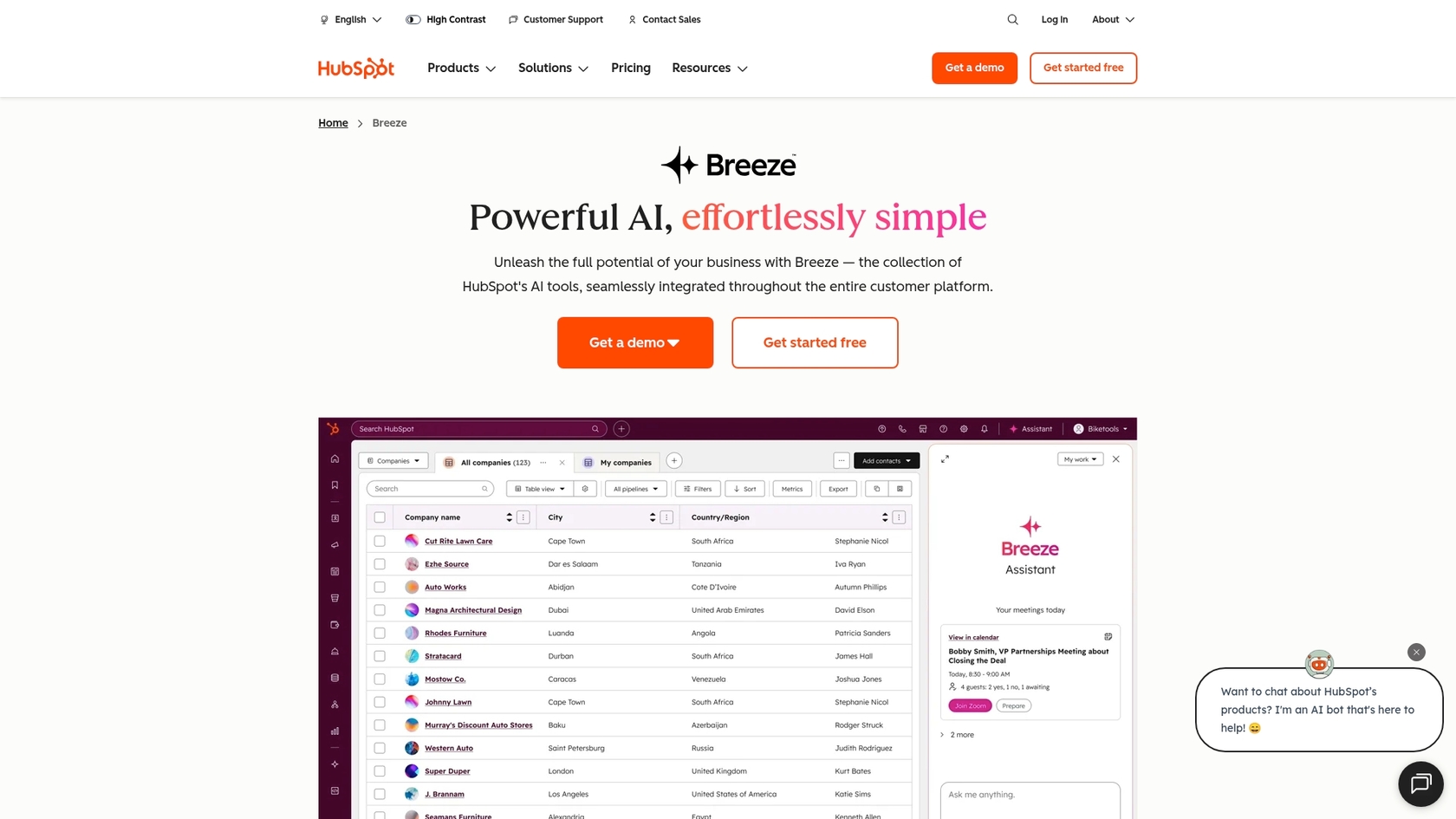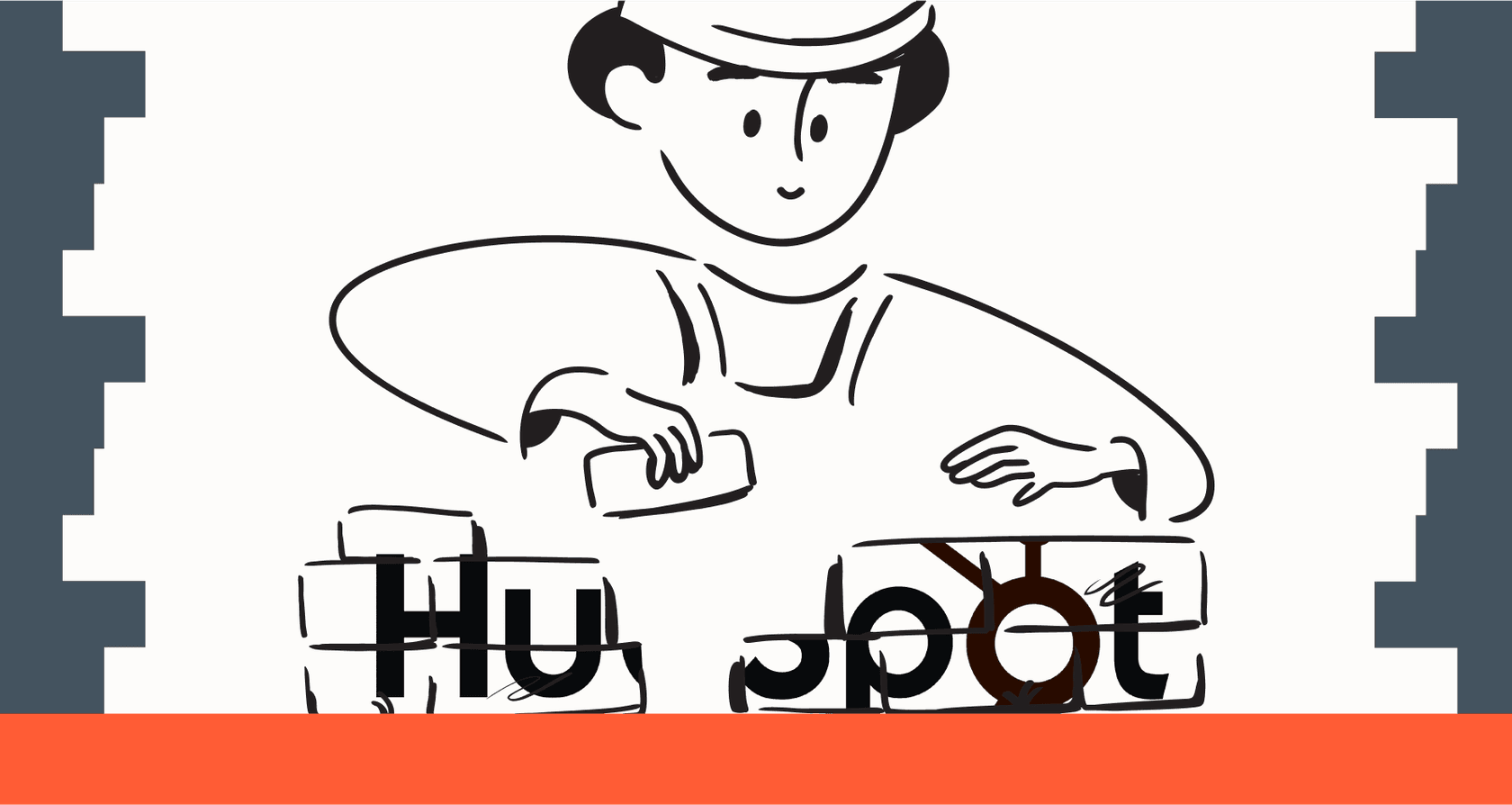The complete guide to choosing a HubSpot compatible AI agent

Stevia Putri

Stanley Nicholas
Last edited January 16, 2026
Expert Verified

HubSpot is a powerhouse for managing sales and marketing. As your business scales, you can unlock even more efficiency by automating the growing volume of customer data. To keep your momentum, your team gets swamped with admin work instead of selling, which is exactly why teams look for a HubSpot compatible AI agent. It’s the tool that helps you automate the boring stuff, speed up response times, and let your team get back to what they’re actually good at.
This guide will walk you through the world of AI agents for HubSpot. We’ll cover HubSpot’s native tools, check out other ways to bring AI into your workflow, and give you a simple framework for picking the right solution for your company in 2026.
What is a HubSpot compatible AI agent?
First off, let's get one thing straight: a HubSpot compatible AI agent isn't just a basic chatbot. It’s a smart tool designed to plug right into your HubSpot CRM to automate workflows, take on specific jobs, and give you insights based on your data. You can almost think of it as a new team member who works around the clock and never needs a coffee break.
Here’s a look at what these agents usually handle:
-
Automating tasks: They take care of the thankless, repetitive work that eats up so much time. We’re talking about data entry, lead scoring, scheduling follow-ups, and making sure contact records are always up to date.
-
Engaging with leads: An AI agent can kick off conversations with new prospects, qualify them by asking the right questions, and then hand off the promising leads to your sales reps.
-
Providing insights: By looking at your CRM data, these agents can spot trends, predict which deals are most likely to close, and suggest the best next move for your team.
Adding an AI agent really changes HubSpot from a simple database into an active tool that helps you grow. It makes sure no opportunities are missed and that your team is always working on the most important things.
Understanding HubSpot's native AI agent: Is Breeze a true HubSpot compatible AI agent?

Before you start looking at third-party tools, it’s worth seeing what HubSpot offers itself. The platform has its own set of AI tools, collectively known as Breeze, that are built directly into the system.
Here's a quick look at what's inside:
-
Breeze Assistant & Agents: These are specific tools for different jobs within HubSpot. The Content Agent helps write blog posts, the Prospecting Agent gives sales outreach a hand, and the Customer Agent can field support questions. They're all designed to work smoothly within the unified HubSpot platform.
-
Breeze Intelligence: This feature hums along in the background, enriching your CRM data by adding extra company and contact info to give you a clearer picture of your leads.
Expanding your capabilities with external integrations
Breeze is a highly capable and integrated solution, for sure, as it is designed to keep your workflows streamlined within the HubSpot ecosystem. For businesses that utilize a diverse tech stack, adding specialized integrations can provide even more flexibility.
HubSpot provides a unified experience by centralizing your data. For many teams, Breeze is at its best when all your company knowledge is stored in HubSpot. If you use other platforms - for example, if your internal wiki is in Confluence, your documents live in Google Docs, or your support team uses a helpdesk like Zendesk - a complementary HubSpot compatible AI agent can help bridge these sources.
Additionally, HubSpot provides reliable, standardized workflows. For teams with highly niche or granular workflow requirements, third-party agents can offer extra customization to suit those specific processes.
Finally, there are seamless integration options. If you want to use AI for customer support while keeping your existing helpdesk, you can easily use a HubSpot compatible AI agent that works across both systems without needing a complete migration.
HubSpot AI pricing: A scalable investment for your team
HubSpot's pricing reflects its status as a mature, enterprise-grade platform. Powerful Breeze features are available within HubSpot's comprehensive subscription plans (Professional and Enterprise), representing a solid investment in your team's efficiency.
HubSpot uses a scalable credit system for its AI features. This allows teams to pay for the value they receive, making it a flexible option as your support or sales volume grows.
| Plan Tier | Starting Price (per month) | Included HubSpot Credits | Key AI Features Included |
|---|---|---|---|
| Professional | $800/mo | 3,000 | Breeze Customer Agent, Social Post Agent, Data Agent (Beta) |
| Enterprise | $3,600/mo | 5,000 | Everything in Pro + Journey Automation, Lookalike Lists, Revenue Attribution |
While Breeze is an excellent and robust place to start for teams who live and breathe HubSpot, specialized third-party tools are often used as complementary options for those seeking additional flexibility.
Three ways to add a HubSpot compatible AI agent
When it comes to plugging AI into HubSpot, you’ve got three main options. Each one has its own benefits.
Approach 1: Use HubSpot’s native AI features
This is a highly efficient route: just use the built-in Breeze agents. It's a smooth path that works perfectly for teams that already use HubSpot for marketing, sales, and service. If your knowledge base, CRM, and support tools are all under one roof, Breeze handles tasks with impressive reliability and ease.
Approach 2: Integrate a specialized third-party HubSpot compatible AI agent
This option involves connecting a dedicated AI platform that already has a pre-built integration for HubSpot. These tools are designed to complement HubSpot by focusing on specific automation needs.
The advantages are clear:
-
Specialized features: These platforms often focus on niche areas like customer support or IT service management, offering advanced capabilities that work alongside HubSpot.
-
Flexibility: They play nicely with HubSpot without making you change your other tools. You can keep your helpdesk, wiki, and document storage exactly where they are.
-
Get going faster: Many platforms are built for a quick, self-serve setup, helping you see results in very little time.
For instance, a platform like eesel AI offers a one-click integration with HubSpot and other tools like Zendesk, Freshdesk, and Slack. You can be up and running in minutes, not months, because it's designed for you to set up yourself. eesel AI is simply one option that can pull in knowledge from all your different apps, including past support tickets, Confluence pages, Google Docs, and Notion, to provide answers that complement your HubSpot CRM data.
Approach 3: Build a custom HubSpot compatible AI agent from scratch
The last option is to build your very own AI agent from the ground up. This involves using developer tools, APIs from large language models, and HubSpot's own APIs.
This approach gives you complete customization so you can build an agent that fits your company's unique processes perfectly. It's a powerful choice for massive companies with very specific needs and the resources to manage ongoing development and maintenance.
How to choose the right HubSpot compatible AI agent for your team
Trying to evaluate all the options can feel like a lot, but it really comes down to asking the right questions. Here's a quick checklist to help you make your decision.
1. How easy is it to set up your HubSpot compatible AI agent?
- Ask yourself: How long is this going to take? Will I need a developer? Can I just do it myself?
Pro TipLook for genuinely self-serve platforms with one-click integrations. A tool like eesel AI lets you connect HubSpot and your other apps in a few minutes, so you can skip the long sales demos and complicated setups.

2. How much control do I have over the HubSpot compatible AI agent?
- Ask yourself: Can I decide exactly what the AI does and doesn't do? Can I tweak its personality and the actions it can perform?
Pro TipA good workflow builder is key. The best agents let you create rules to automate the simple questions while sending the tricky ones to your team. With eesel AI, you can use a prompt editor to define the AI's tone of voice and even set up custom actions, like looking up an order status or routing a ticket.

3. Where does the HubSpot compatible AI agent get its knowledge from?
- Ask yourself: Can this AI learn from more than just our website or a single knowledge base article?
Pro TipYour company's knowledge is valuable. Pick an agent that can connect to your past tickets, internal wikis like Confluence or Notion, and documents in Google Docs. eesel AI is designed to bring together this scattered information to provide helpful answers.

4. Can I test the HubSpot compatible AI agent without risk?
- Ask yourself: How do I know if this thing will actually work before I let it talk to my customers?
Pro TipYou should never launch an AI without testing it first. eesel AI has a *simulation mode* that lets you test your setup on thousands of your past HubSpot tickets. This lets you see exactly how it would have performed, helping you fine-tune its behavior before you flip the switch.

5. Is the HubSpot compatible AI agent pricing clear and predictable?
- Ask yourself: Is the pricing easy to understand? Are my costs going to suddenly shoot up?
Pro TipLook for platforms that have clear, tiered plans based on how much you use them. HubSpot offers excellent tiered options, and eesel AI offers straightforward monthly or annual plans, so your costs are always easy to predict.

This video provides a comprehensive guide on how you can build your own AI to call leads in HubSpot.
Go beyond HubSpot's limits with the right HubSpot compatible AI agent
HubSpot is an incredible tool for any sales or marketing team. To scale your operations and give your customers a top-notch experience, you can complement your HubSpot CRM with a compatible AI agent that provides even more flexibility.
While HubSpot's built-in AI is an excellent choice for integrated tasks, a specialized third-party tool can be a great addition for companies with specific multi-platform needs. Building one from scratch is a powerful option for large enterprises, but for teams that want a balance of power and simplicity, eesel AI is a great choice. It's easy to use, customizable, and brings together your knowledge to work seamlessly with HubSpot and the other apps you use every day.
Frequently asked questions
A HubSpot compatible AI agent is a smart tool that integrates directly with your HubSpot CRM to automate complex workflows and provide data-driven insights. Unlike a simple chatbot, it performs specific jobs like lead qualification, data entry, and proactive engagement based on your CRM data. It acts more like an automated team member, freeing up your human staff.
HubSpot's Breeze tools are powerful and highly effective when operating within the HubSpot ecosystem. To further enhance your setup, a HubSpot compatible AI agent can bridge the gap if you use external tools like Confluence or Zendesk. This ensures your AI has access to your entire company's knowledge across multiple platforms, providing a more comprehensive solution for complex workflows.
A HubSpot compatible AI agent can automate a wide range of repetitive tasks. This includes data entry, lead scoring, scheduling follow-ups, keeping contact records updated, engaging and qualifying new leads, and providing insights by analyzing CRM data to predict deal closures and suggest next steps. These automations allow your team to focus on high-value activities.
Many specialized third-party AI agents offer remarkably simple setup processes, often with one-click integrations for HubSpot and other business tools. Platforms like eesel AI are designed for self-serve setup, allowing you to connect your systems and get started in minutes, rather than requiring lengthy sales calls or complex development work.
Yes, a major advantage of specialized third-party HubSpot compatible AI agents is their ability to integrate with and learn from diverse knowledge sources beyond HubSpot's native database. They can pull information from platforms like Confluence, Notion, Google Docs, and even past support tickets to provide more comprehensive and accurate answers.
Look for AI agents that offer a robust simulation mode for testing. For instance, eesel AI allows you to test your AI's performance against thousands of your past HubSpot tickets. This enables you to accurately forecast automation rates, fine-tune the AI's behavior, and ensure it meets your expectations before it goes live.
When evaluating pricing for a HubSpot compatible AI agent, prioritize clear, predictable models that align with your growth. HubSpot offers tiered plans that scale with your needs, and many third-party tools offer straightforward monthly or annual plans. Look for a solution that ensures transparency and predictability for your budget.
Share this post

Article by
Stevia Putri
Stevia Putri is a marketing generalist at eesel AI, where she helps turn powerful AI tools into stories that resonate. She’s driven by curiosity, clarity, and the human side of technology.





